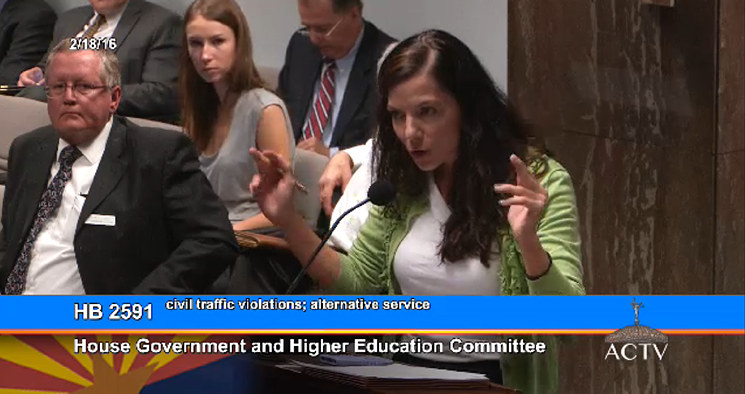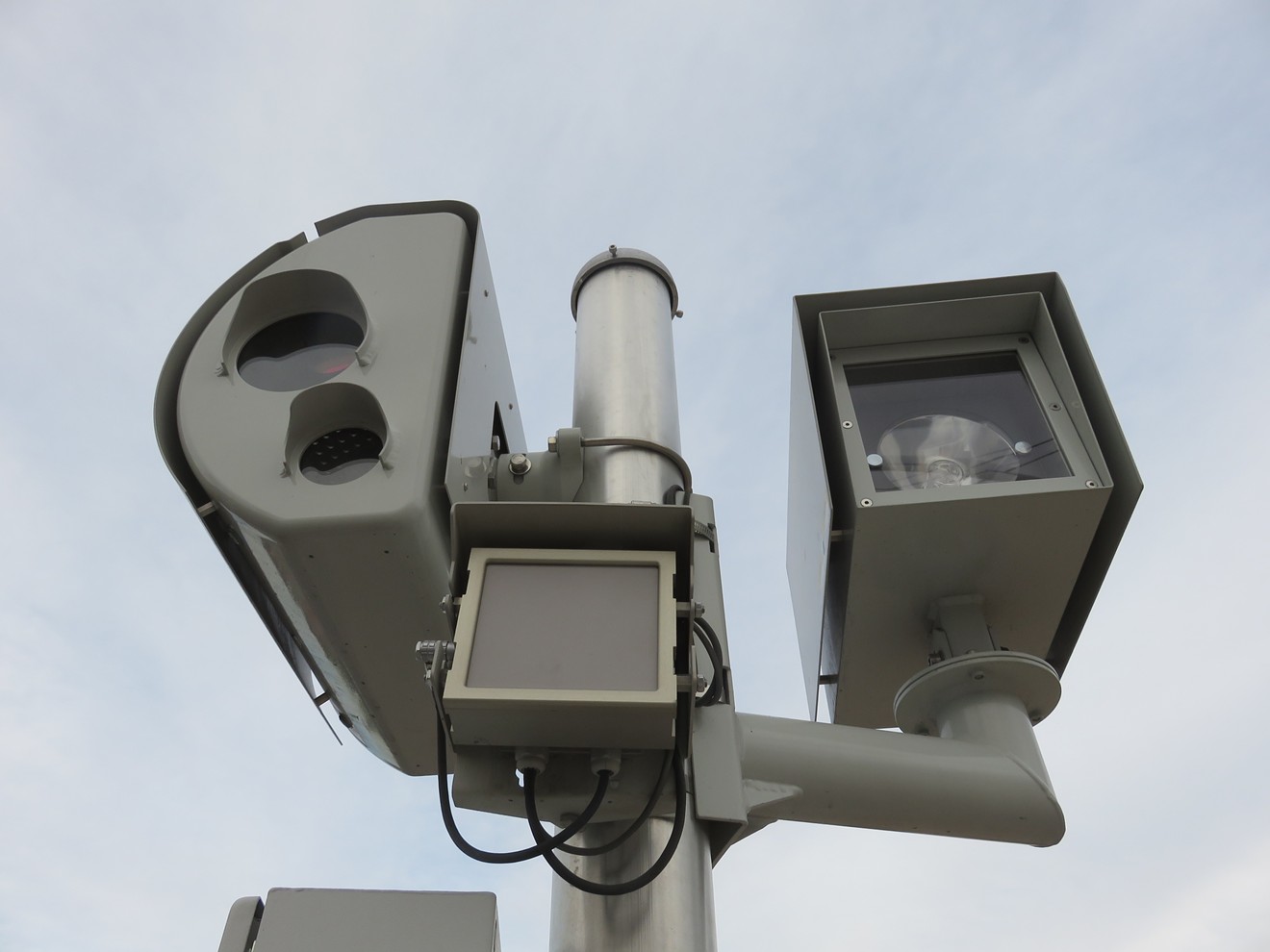Signed by Governor Doug Ducey last year, the law — one of several that took effect January 1 —
effectively rewards violators for dodging a process server. It bans the state from suspending a driver's license in photo-enforcement cases that use "alternative service," a special court action that permits a process server to tape a violation notice to a person's front door.
About a dozen cities use speed- and red-light cameras in Arizona, including Scottsdale, Paradise Valley, Phoenix, Mesa, Chandler, and El Mirage. But Scottsdale, which uses Mesa-based American Traffic Solutions as its vendor, is the only city that uses alternative service to force compliance with its camera-ticket program. That means the rule change affects only Scottsdale, arguably the state's toughest photo-radar town.
But the city court vows to keep using alternative service, and officials noted they have other means of bringing scofflaw motorists to justice. Still, the law could conceivably slow Scottsdale's use of the strategy.
The new law is only the latest attack on speed- and red-light cameras by the GOP-dominated Arizona Legislature, and one of at least three major actions taken against photo-enforcement in 2016. In addition to a law last year that banned photo enforcement from state highways, state Attorney General Mark Brnovich released an official opinion stating that vendors including ATS and its competitor, Redflex, needed to obtain private-investigator licenses. That halted programs around the state for a few weeks last spring, until the vendors acquired the paperwork.

State Representative Michelle Ugenti-Rita, R-Scottsdale, sponsored the bill targeting alternative service.
Arizona State Legislature
Last year was a bad one for the photo-enforcement industry as a whole, with a high-profile corruption trial that ended in a 30-month prison sentence for former Redflex CEO Karen Finley of Cave Creek.
The biggest problem for machine-generated tickets in Arizona, though, has always been how easy they are to ignore.
Under Arizona law, mailed tickets have no teeth. A civil traffic ticket is a weighty thing and must be personally handed to the violator by a representative of the state, or served to someone of reasonable age who lives at the violator's home.
On a mailed violation notice, the fine print asks violators to waive that right to proper service. One way to preserve the right is to throw the notice in the garbage.
The city has 90 days to serve the ticket after the case is filed in court. If the violator can't be found by then, the court dismisses the case with no penalty for the violator. If the server finds and serves the violator, the person then has to deal with ticket just as if it was received by a police officer and pays about $40 extra for the process service.
For years, Scottsdale has fought back against the hordes of violators who never answered when process servers came knocking (often as the offender's vehicle sat parked in the home's driveway). Caron Close, the city prosecutor, has her office work with process servers to put together cases for alternative-service motions before city judges. They show the server had tried to deliver the ticket several times, at different times of day and then, once a judge grants the motion, servers affix a conspicuous notice to the alleged violator's property and mail a certified letter with a copy of the citation — all of which cannot legally be blown off.
Previously, ignoring the citation at that point meant the city court would instruct the state Motor Vehicles Department to suspend the violator's license. That led to concern by state leaders that some people might honestly never see the alternatively served violation notice and not realize a problem had occurred until after the license suspension.
The law's sponsor, State Representative Michelle Ugenti-Rita, a Republican who represents part of Scottsdale and Fountain Hills, testified last year that the state should probably ban alternative service entirely, if not just for the name "alternative."
"Alternative service is sneaky," she told the House Government and Higher Education Committee on February 18. "It's a get-around. I find it not to be in the public's best interest."
Records show that Ugenti-Rita, 36, has at least two Scottsdale photo-enforcement violations, one from 2011, and another from late 2015 that she paid the day before her panel testimony — though she didn't mention her personal experience. She also received a ticket for speeding prior to a collision in 2013 in Chandler, records show.
The law will have some impact, it seems, but it's unclear how much. Sergeant Ben Hoster, spokesman for the Scottsdale Police Department, says it won't make a difference as far as police are concerned.
Julie Dybas, Scottsdale court administrator, referred questions to court spokesman Kelly Corsette, who released a statement about the new law on Monday indicating that scofflaws pegged by alternative service will still be responsible for the ticket:
"We will still use alternative service summons in photo radar cases," Corsette wrote. "For those that are not resolved through that process, payment of fines would go to default and referred to a collection agency. Individuals will still face points on their license for traffic violations."
Also on Monday, the city released an updated fact sheet on alternative service, detailing how it works and releasing new statistics that show Scottsdale's use of the service has increased since 2014.
The city used alternative service in 3.7 percent of its 45,164 photo-enforcement citations that were issued in 2014, for example, but that rose to 4.4 percent in 2015 and 2016. The number of citations has risen, as well, to 55,154 citations issued in 2015. Only 40,561 tickets were issued in 2016, but the smaller showing is largely due to the program's hiatus after Brnovich issued his opinion.
A side note on the fact sheet relates that the city began using alternative service in May 2008, and that it has been the "fairest, most effective way to complete the process at the least cost to the taxpayers."
The low percentages for alternative service don't tell the whole story, because many (if not most) citations don't require any attention from a process server — that is, the violator waives the right to a process server and pays the fine immediately. Only about 65 percent of notices of violation get turned into citations, according to a 2015 city audit of the photo-enforcement program. For 2015, that means about 30,000 notices of violation never turned into citations, despite the use of alternative service in 2,425 cases.
Notices of violation fail to become citations for several reasons, besides the fact that a process server simply can't find the suspected speeder or red-light runner. When the person in a driver's-license photo doesn't match the driver in the photo-enforcement photo, the case is thrown out of court unless someone rats out the driver. (Another Arizona law states specifically that people have no duty to fib on a photo-enforcement suspect.)
The 2015 audit states that about 45 percent of notices sent to corporations never get returned, either.
Read the City of Scottsdale's fact sheet regarding alternative service summonses:
City of Scottsdale fact sheet regarding alternative service summonses













